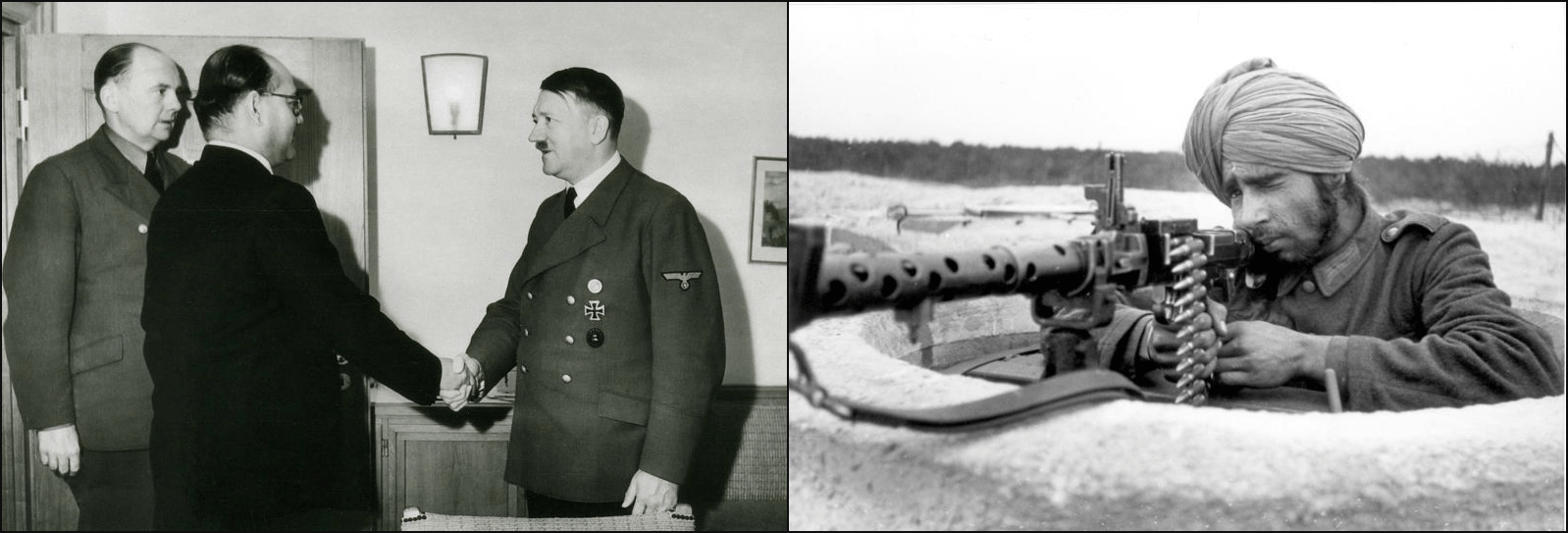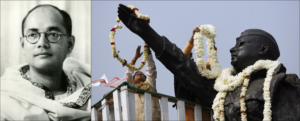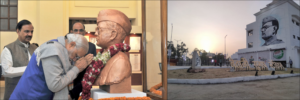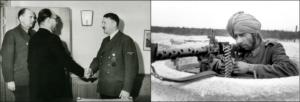Nazi collaborator monuments in India
While Subhas Chandra Bose is seen by some as a freedom fighter, his alliance with Hitler and the Waffen-SS cannot be ignored

Left: Subhas Chandra Bose, middle, meeting Hitler in East Prussia, Germany May 27, 1942 (Wikimedia Commons). Right: German propaganda photo of Indian Legion soldier near Bordeaux, France, March 21, 1944 (Bundesarchiv, Bild 101I-263-1580-06/Wette via Wikimedia Commons). Image by Forward collage
This list is part of an ongoing investigative project the Forward first published in January 2021 documenting hundreds of monuments around the world to people involved in the Holocaust. We are continuing to update each country’s list; if you know of any not included here, or of statues that have been removed or streets renamed, please email [email protected], subject line: Nazi monument project.
Note: due to the overwhelming number of statues, plaques, institutions and street names for Subhas Chandra Bose in India, this section is only a partial listing.

Kolkata — In 2019, then-chief of staff to Rep. Alexandria Ocasio-Cortez, D-N.Y., triggered headlines when he wore a T-shirt with the image of Nazi collaborator Subhas Chandra Bose (1897–1945). Bose, often called Netaji (“respected leader”), was an Indian nationalist who created and recruited soldiers for the Free India Legion aka the Indian Legion. Formed in 1941, the legion was originally part of the German army; in 1944 it was transferred to the Waffen-SS (the military wing of the Nazi Party responsible for, among other war crimes, the Holocaust) and became the Indian Volunteer Legion of the Waffen-SS. It fought against the Allies in France, where it was tasked with suppressing the French Resistance; the unit gained a dark reputation for crimes against civilians.
Bose aided Hitler’s cause even prior to recruiting soldiers for the Third Reich. In 1938, Jawaharlal Nehru, a hero of India’s freedom struggle who later became the country’s first prime minister, led the effort to allow Jewish refugees to escape persecution and come to India. Bose actively blocked Nehru’s attempt. (India ended up rescuing Jews and Poles – see the Forward, India Times, The Hindu and Atlas Obscura.)
Bose’s defenders use the same justification as whitewashers of other nationalist collaborators – they rebrand Bose and the Indian Legion as freedom fighters who fought against Britain, not lackeys who fought with Hitler. The fact remains, Bose recruited thousands of men who fought in the Waffen-SS against the Allies, suppressed anti-Nazi resistance and enabled Germany to continue its genocide of Jews and Roma.
The Kolkata metropolitan area is a hub of Bose glorification: in addition to the colossal statue at Maidan park, above right, Bose has an airport (with statue), road, metro station, stadium, memorial and research center (with bust), another museum, cancer research institute, ancestral house (with bust), college and university as well as statues/busts in the Alipore, Bablatala, Bagbazar, Baguiati, Baidyabati, Barasat (a second statue), Barrackpore, Baruipur, B.B.D. Bagh, Belur, Bidhannagar (a second statue and bust in Jai Hind Park), Budge Budge (and bust), Chengail, Chetla, Dakshineswar, Dasnagar, Dum Dum, Garia, Ghusuri, Haridevpur, Howrah, Hridaypur, Ichapur (a second statue, bust and wall sculpture), Jagatdal (and bust), Jorasanko, Kamarhati, Kankurgachi, Konnagar, Liluah, Mali Panchghara, Nalpur, Narkeldanga, Netaji Nagar, Newtown, Paschim Barisha, Rajpur Sonarpur, Ram Bagan, Rania Mauza, Santoshpur, Santragachi, Satpukur, Serampore, Shyambazar (and relief sculpture), Sinthee, South Dum Dum (and five busts: first, second, third, fourth and fifth), South Garia, Subhasgram and Tangra neighborhoods/municipalities as well as at a naval base named after him. See coverage in JTA, Newsweek and Jewish Journal with a quote from the Simon Wiesenthal Center.
(Note: The Baguiati, B.B.D. Bagh, Howrah, Netaji Nagar, Newtown and South Garia monuments were added June 2025.)

New Delhi and multiple other locations — India’s Prime Minister Narendra Modi, who champions the cult of Bose, with his bust in the capital of New Delhi, above left. The Delhi area also has a statue of Bose in the Parliament House, another statue, a park (with monument), university (with statue), a bust at Delhi University, museum, bust, metro station, neighborhood and sports complex.
In September 2022, Modi installed a Bose statue in the canopy of the India Gate, a colossal war memorial in the center of New Delhi, to commemorate the 75th anniversary of India’s independence as well as Bose’s 125th birthday. The unveiling was highly symbolic not only due to its prominent location but also because the canopy once housed a statue of George V, the colonial ruler of India.
Bose has an astounding number of statues, streets and institutions throughout India. A very partial list includes a museum and bust in Kurseong; a college (with bust), school (with bust), bridge and museum (with bust and statue) in Cuttack; a medical institute in Bhubaneswar and Bihta; a pharmaceutical institute in Tatla; a school (with bust) and statue in Agartala; a medical college and statue in Jabalpur; an institute, statue and memorial in Patna; a college and statue in Arambag, Jamshedpur (two busts: first and second), Murshidabad (statue), Sambalpur and Udaipur; a rail station (with bas-relief) in Gomoh; a school in Doiwala; a college in Haldibari; a temple in Varasani; a stadium in Raipur (above right); an island in the Andamans; and a government building in Panchkula.
There are also Bose statues/busts in:
Ahmedabad (circle with statue), Ailakundi P, Ajmer, Aligarh, Alipurduar (a second statue), Allipur, Amalner, Amaravati, Ambala (in Netaji Subhash Park) Amravati, Amritsar, Andaran Phulbari, Asansol (a second, third and fourth statue and bust), Aurangabad;
Babupeth, Badepalle, Baghmundi, Bagnan, Bainan, Bangalore (a second statue and two busts: first and second), Bangaon, Bankura, Basirhat, Berhampore, Bhopal, Bijni, Birkulti, Birnagar, Bishnupur, Bokajan, Bokaro Steel City (park with bust), Bokaro Thermal (park with statue), Bolpur, Budaun, Burdwan (a second statue and three busts: first, second and third), Burhanpur, Burikhali;
Chakdaha, Chanchal, Chandrakona, Chennai (and bust), Chilakaluripet, Chinchuria, Chinsurah, Contai, Chuprijhara;
Dakhin Narathali, Dalhousie, Darbar Khan Bar, Daspur, Debra, Dhandadihi, Dhanyakuria, Dharwad, Dhatrigram, Dhekiajuli, Dhule, Dhuliyan, Dubrajpur, Durgapur (and statue with separate map monument);
Farakka, Farooqnagar, Farsara;
Galsi, Gambhiraopet, Gauripur, Gazole, Golakganj, Golapganj, Gudiyatham, Gunjapadugu, Guntur, Gurugram, Guwahati (a second and third statue);
Habra (and bust), Haflong, Haldia, Haliyal, Haridwar, Hatgram, Hisar, Hyderabad (and three busts: first, second and third);
Jaigaon, Jaipur, Jalpaiguri, Jammikunta, Jamnagar, Janardanpur, Jangaon, Jasthipalli, Jaynagar Mazilpur, Jiaganj Azimganj (a second and third statue);
Kakraban, Kalaburagi, Kalna, Kalyayni, Kalyanpur, Kamanpur, Karon (and bust), Karur, Katwa, Khammam, Kharagpur, Khayrasole, Khunti, Kolaghat, Kompally, Kothapalle (Karimnagar district), Kotulpur, Krishnanagar;
Lachhamanpur, Lakhana Bandha, Lakhipur, Lakshmipur (stadium and statue), Lalgarh, Lanji, Lapuria, Lucknow;
Madurai, Madhupur, Madhyamgram, Magurali, Mahishasthali, Mal Bazar, Malda (a second statue), Maliara, Mandawa, Manwath, Marsur, Mejia, Moiran, Mucherla, Mugkalyan, Mukkapadu, Mumbai (a second statue);
Nabadwip, Nagaon, Nagpur (and bust), Nalgonda, Nalhati, Nandigama, Nellore;
Pachagarh, Palampur, Parulia, Pingla, Plassey, Port Blair (and stadium), Prayagraj, Puri (and museum);
Raghabpur, Railapur, Rajkot, Rajmahal, Ramajipet, Ramjibanpur, Ranaghat (and bust), Rangapara, Raniganj (a second bust), Rayna, Rewa, Rohtak;
Sadpur, Sainthia, Salboni, Santharavuru, Santipur, Santoshpur Pila, Sat Bainer Tup, Secunderabad, (a second and third statue and two busts: first and second), Shaktinagar, Shillong (a second statue at the State Central Library), Siddipet, Silchar, Siliguri (a second, third, fourth, fifth, sixth and seventh statue and four busts: first, second, third and fourth), Singur, Sircilla, Sivaganga, Sonakhira, Sukdal, Suri;
Tadepalle, Taherpur, Tamluk, Tarakeswar, Thakur Nagar, Thiruvananthapuram, Tinsukia, Tirupati;
Udarbond, Uttar Bhotbari, Uttar Ramkishorpur;
Vadodara, Vellula, Vemulawada, Vijayawada (a second statue), Visakhapatnam;
and Yethbarpalle.
Below left, Bose meets with Hitler in East Prussia, 1942. That year, he also met with Heinrich Himmler, head of the SS and one of the principal architects of the Holocaust. Below right, Indian Legion fighter mans a post in Bordeaux, 1944.

(Note: The Netaji Subhas Chandra Bose All India Institute of Medical Sciences in Bhubaneswar has been renamed All India Institute of Medical Sciences, Bhubaneswar.
The India Gate; Dhule; Golakganj; Hatgram; Jaigaon; Lakhipur; Malda; Sadpur; the second Alipurduar and the second Nagpur monuments; the college and statue in Sambalpur; and the universities in Jamshedpur and Tatla were added January 2023.
The Ahmedabad, Allipur, Amaravati, Andaran Phulbari, Asansol (the third statue), Aurangabad, Babupeth, Badepalle, Baghmundi, Bagnan, Bangalore (both busts), Birkulti, Birnagar, Bishnupur, Bokaro Steel City, Bokaro Thermal, Chanchal, Chilakaluripet, Chinsurah, Chuprijhara, Darbar Khan Bar, Dhandadihi, Dhekiajuli, Dhuliyan, Dubrajpur, Farooqnagar, Farsara, Galsi, Gambhiraopet, Gauripur, Gudiyatham, Guntur, Haflong, Haliyal, Hyderabad, Islampur (bust), Jammikunta, Jamshedpur (the second bust), Janardanpur, Jangaon, Jaynagar Mazilpur, Jiaganj Azimganj (the second and third statues), Kalaburagi, Kalyanpur, Kamanpur, Karur, Khayrasole, Khunti, Kompally, Lachhamanpur, Lakshmipur, Lalgarh, Lanji, Madhupur, Madhyamgram, Malda (the second statue), Maliara, Mandawa, Mejia, Mugkalyan, Nabadwip, Nalgonda, Nandigama, Nellore, Pachagarh, Panchkula, Raghabpur, Railapur, Rangapara, Raniganj, Rayna, Rohtak, Santharavuru, Santipur, Sat Bainer Tup, Secunderabad (the second and third statue and both busts), Shaktinagar, Siliguri (the sixth and seventh statue and second, third, and fourth busts), Sircilla, Sivaganga, Sonakhira, Sukdal, Tadepalle, Tamluk, Thakur Nagar, Tirupati, Udarbond, Uttar Bhotbari, Uttar Ramkishorpur, Vellula, Vijayawada, Wardha and Yethbarpalle monuments were added June 2025.)





















